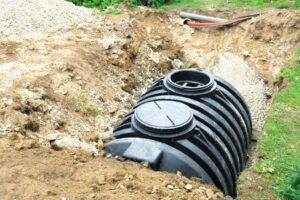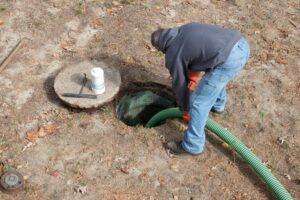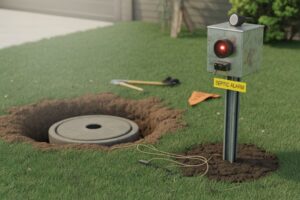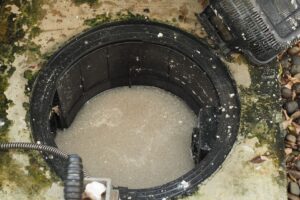You’re sitting there watching TV or trying to sleep, and suddenly there’s this beeping sound. Takes a minute to figure out where it’s coming from—then you realize it’s the septic alarm. Great. Most homeowners have no idea what to do when this happens. The septic system alarm keeps beeping, you’re not sure if it’s an emergency, and you’re definitely not excited about what might be wrong with it.
If you live anywhere around Mount Vernon, Stanwood, Oak Harbor, Sedro Woolley, and the surrounding areas, you’re probably dealing with the same septic system maintenance challenges as your neighbors. Understanding what that alarm actually means and knowing what to do about it can save you from expensive problems later. Let’s break down what’s happening and how to handle it.
What Is a Septic Alarm and Why Do You Have One?
Not every septic system has an alarm. Older systems generally don’t. But if your property sits on a slope, or your system uses a pump to move wastewater, there’s probably an alarm somewhere—maybe in your garage, basement, or utility room. These alarms exist for one reason: to warn you before small problems turn into disasters.
How It Works:
Float Switches:
Think of these like the float in a toilet tank. They rise and fall with the water level, but these trigger an alarm when the water gets too high.
Trigger Point:
According to leading septic system maintenance experts in Oak Harbor, every system has a specific level at which the alarm kicks in. Water shouldn’t reach that point during normal operation.
Notification:
Could be a steady beep, flashing red light, or both. Depends on the system installed.
The alarm isn’t there because your system is bad. It’s preventive. Without it, you might not know anything’s wrong until sewage backs up into your house. By then, you’re looking at serious damage and cleanup costs.
Quick fact: Homes with septic alarms deal with expensive sewage backups about half as often as homes without them.
What’s Happening When Your Septic Alarm Goes Off
Different things set off the alarm. Some need immediate attention, others can wait a bit:
| What’s Wrong | What It Means | How Fast You Need to Act |
| High Water Level | Tank is filling up too fast | Deal with it immediately |
| Blocked Outlet or Drain | Something’s clogged in the pipes or drainfield | Pretty urgent |
| Pump Malfunction | Pump quit working or got stuck | Very urgent |
| Electrical Issue | Problem with alarm wiring or panel | Fairly urgent |
Tip: Don’t brush off the alarm. Even if it shuts off by itself, figure out what caused it. Ignoring it can lead to backups, bad smells, or damage to your property.
High water levels mean your tank is filling faster than it’s emptying. Maybe everyone took long showers this morning. Maybe the pump isn’t working. Maybe there’s a blockage preventing drainage. The point is, water’s accumulating when it shouldn’t be.
Blockages happen in outlet pipes or the drainfield itself. Tree roots grow into pipes. Grease builds up over the years. Sometimes the drainfield soil just gets saturated and stops absorbing water properly. These problems develop slowly, but the alarm catches them before complete failure.
Pump malfunctions are straightforward—the pump’s supposed to move water out of the tank, but it’s not. It could be that the pump itself failed, that it’s electrical, or that something is jamming it. Either way, water’s not going anywhere.
Top septic tank system inspection in Mount Vernon reveals that electrical issues can cause false alarms or prevent a working pump from running. Less common than other causes, but it still happens. Sometimes it’s just a tripped breaker.
Step-by-Step — What to Do When the Septic Alarm Sounds
Here’s what to actually do when that alarm starts up:
Stay Calm
First thing—don’t panic. The septic alarm going off doesn’t automatically mean sewage is about to flood your house. You’ve got time to figure this out.
Check the Tank Access
Some homeowners feel comfortable checking their tank access panel; others don’t. If you do check it, be extremely careful. Septic tanks produce hydrogen sulfide and methane. Both are dangerous. Never put your face near the opening, and definitely don’t climb into a septic tank for any reason.
Inspect the Pump or Float Switch
If you can see the pump chamber from the access point, look for obvious issues. Is the float switch hung up on something? Any visible debris blocking the pump? Sometimes it’s something simple like a float that got stuck.
Reduce Water Usage
Stop using excessive water immediately. Don’t do laundry. Keep showers short. Don’t run the dishwasher. Give the system a break. If it’s just a temporary overload from heavy usage, reducing demand might let it catch up.
Document Observations
Write stuff down. When did the alarm start? What’s the water level look like? Did you check? Any sewage smells? Strange sounds? Your septic technician will ask these questions, and having answers ready will speed up the diagnosis.
Call for Professional Help if Needed
If the alarm’s still going after a few hours of reduced water use, call a septic tank system maintenance contractor in Sedro Woolley, Oak Harbor, and the surrounding locations. If you see sewage backing up anywhere, call immediately. Don’t wait around hoping it’ll fix itself—it won’t.
When to Call for Professional Septic Service
Stop trying to fix it yourself and call a professional when:
- The alarm won’t shut off even after you’ve stopped using water for several hours
- There’s sewage showing up in your yard or backing up into the house
- Multiple drains are slow throughout the house—not just one sink
- You smell sewage around the tank area or drainfield
Gateway Septic Service and other reputable companies deal with these calls constantly. We’ve diagnosed hundreds of septic system alarm situations. What seems mysterious to you is routine for us. We’ll figure out what’s wrong way faster than you will, and we have the equipment actually to fix it.
How to Prevent Future Septic Alarm Issues
Want to avoid dealing with septic alarms going off? Stay on top of basic maintenance:
Schedule Routine Inspections:
Have someone who knows what they’re looking at check your system every couple of years. They’ll spot problems developing before alarms start going off.
Mind Your Water Use:
Doing seven loads of laundry on Saturday overwhelms your system. Spread it out over the week. Same with dishwasher use—run it at night when nobody’s showering.
Avoid Harmful Additives:
People will try to sell you all kinds of septic tank additives. Most professionals will tell you they’re unnecessary at best and potentially harmful at worst. Skip them.
Protect the Drainfield:
Don’t park on it. Don’t build a shed over it. Don’t plant trees near it. The drainfield needs air circulation and shouldn’t be weighed down, as this can compact the soil.
Homeowners around Mount Vernon and Stanwood who stick to regular septic system maintenance rarely deal with emergency situations. The ones calling with backed-up sewage on Sunday night? Usually, they haven’t had their tank pumped in 10 years.
Choosing a Reliable Septic Service Company
Finding someone reliable matters a lot. Here’s what actually makes a difference:
Experience
How long has this company been around? Septic work requires real knowledge—you don’t want someone learning on your system.
Comprehensive Services
Can they do everything? Inspections, pumping, repairs, installations? It’s way easier to deal with one company that knows your system’s complete history than to call different people for different problems.
Local Knowledge
Companies like Gateway Septic Service, which have been working around Oak Harbor and Sedro Woolley for years, understand local conditions. We know what soil types are common in different areas, what problems tend to develop, and how county regulations work.
Prompt Response
When it’s an emergency, you need someone who answers the phone and shows up fast. Companies that make you wait three days for a callback aren’t going to help when sewage is backing up.
Transparent Pricing
Get clear pricing before work starts. Some companies quote one number, then surprise you with extra charges afterward. Reputable providers tell you upfront what it’ll cost.
Gateway Septic Service has operated in the Skagit area for decades. We handle all septic-related work, show up when scheduled, and charge what we quote. That combination is harder to find than you’d think.
Final Takeaway — Keep Your Septic System Healthy and Worry-Free
When your septic alarm goes off, treat it as useful information, not a disaster. Find out why it’s happening, deal with it, and don’t skip regular septic system maintenance and inspection service going forward. Most big septic problems don’t have to happen if you take care of the basics.
For properties in Mount Vernon, Stanwood, Oak Harbor, Sedro-Woolley, and the surrounding communities, experienced local septic system maintenance and inspection professionals make a real difference. We understand conditions here, respond quickly to problems, and provide the complete range of services your system needs.
Gateway Septic Service has been doing this for years. We know how septic systems work in Skagit County. We handle regular pumping and tougher repairs, and people trust us because we show up and get the job done right.
Schedule regular service now, and you’ll probably never deal with an emergency. That approach saves money, eliminates stress, and protects your property.
Ensure your septic system is running smoothly and efficiently—contact Gateway Septic Service today at 360-826-5520 for inspections, maintenance, and all your septic care needs.






